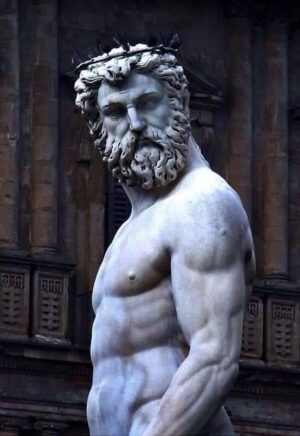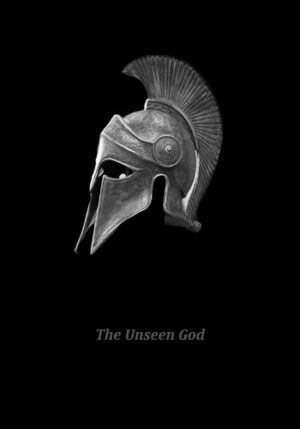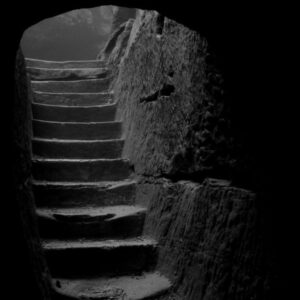Hades is well-known as the infamous god of The Underworld. He is accompanied in this underworld – also called Hades – by his lovely wife Persephone, the goddess of Spring, and his trusty hellhound, the three-headed Cerberus.
He is the god of the dead, not the god of death – that’s Thanatos, who is considered the very incarnation of death. Hades also oversees the domain of money, riches, and all the physical wealth from within the Earth as well.
Since God Hades wasn’t traditionally worshiped in ancient Greece, it can be difficult to find information on working with him in a neopagan aspect. It’s only recently that pagans are daring to even invoke his name.
Let’s take a dive into the depths of Hades and discover the relationship between mythology and modern practice.
The God Hades In History & Myth:
To better understand the nature of Hades as an archetype, let’s take a look at some of the myths surrounding the god who would be crowned king of The Underworld.
In The Beginning: The Titanomachy

Hades is the reigning king of the dead, a position given to him when the universe was divided up after the great war called the Titanomachy.
Although he doesn’t reside on Mount Olympus, Hades shares the same parents as Zeus and the other Olympians: the ancient titans Chronus and Rhea. If you don’t know, Chronus swallowed all of his children whole based on a prophecy stating that they would overthrow him. That is, except for Zeus, who Rhea hid away in a cave somewhere on the island of Crete. When Zeus was of age and properly trained, he returned to Chronus in disguise and tricked his father into vomiting his siblings back up.
So although Hades was originally the oldest of the siblings, he was the last to be “reborn,” in this sense. Perhaps that’s why he was later given The Underworld, a gesture that is commonly viewed as Hades getting the short end of the stick.
Zeus and his once-swallowed siblings then came together to slay Chronus and put an end to his tyrannical, child-eating ways. (Thank the gods!)
To aid in their endeavor against the Titans, the cyclopes crafted three epic items: to Zeus, the power of lightning and thunder (personified by his trusty lightning bolt), Poseidon’s famous Trident, and the Helm of Invisibility to our main man Hades. The three fought together to encase the Titans in Tartarus, from where they could never return.
Ultimately, Hades’ part in winning this epic battle for supremacy was futile, for he would not be reigning with the gods on Olympus after all. After the battle, Zeus was given reign over all of Olympus. Poseidon would rule the oceans. For Hades, the realm of the dead would have to suffice.
Hades & Persephone

Many know the famous tale of Hades’s abduction of Persephone (if not, check out our post on worshiping her here), as it was commonly taught as the source of the changing of the seasons.
In this tale, Persephone, the goddess of Spring, spends the warmer months with her mother Demeter, the goddess of grain and agriculture. During this time, Demeter is overjoyed and allows the flowers to bloom and the world to flourish.
In Autumn, Persephone returns to The Underworld to be with her husband (and captor, depending on the source) Hades. During this time, Demeter misses her daughter so much that she lets the world wither. Since that is more their story, that’s all the detail we’ll go into here. Head to our post on Persephone for more details on how this came to be.
While this is one of the most commonly told myths regarding the King of The Underworld, it’s important to remember that these tales were oral traditions retold over many generations, and many of the details may vary from one version to another or be distorted based on the cultural views of the time period.
For example, we see themes of rape, kidnapping, and sexual assault used as plot devices quite often in Greek mythology. These may be tales of a deity’s actions or they could reflect the actions of politicians or authority figures at the time of the story’s creation.
While some know this as a devastating tale of kidnapping, some see Persephone as a figure that is torn by love, as she is forced to make an impossible decision between her own mother and the god she loves.
Despite Hades’s dark side, he is one of the only husbands among the Greek gods who remained faithful to his wife, so it may be surprising to learn that Persephone is not the only ethereal entity that has captivated the Lord of Riches.
The Tragedy Of Romancing Nymphs

As you may expect, many of the myths involving Hades highlight his wrath and quickness to deliver just punishment. Others, however, show a gentler, more romantic side of Hades.
Minthe was a naiad, or water nymph, that was once greatly loved by Hades. After he wed Persephone, Minthe talked a lot of shit, claiming that she was far more beautiful than Persephone and could steal Hades back if ever she wanted.
In response, Persephone absolutely destroyed Minthe. In some myths, Persephone turned her into the mint plant and tore her to pieces out of sheer jealousy. In others, it was Persephone’s mother Demeter who trampled Minthe, reducing her to a plant in the process.
While we’re on the topic of transforming nymphs into plant forms, let’s talk about the origins of the white poplar tree.
Leuce, daughter of the Titan Oceanus, has a back-story that may seem all-too-familiar: Kidnapped by Hades and brought to The Underworld, Leuce never escaped. Spending the rest of her days in Hades, when Leuce passed on she was turned into the white poplar tree.
Ever since, the white poplar has been held in high regard by Hades. In the Elysian Fields, it’s said there is a grove of white poplar trees – a living graveyard to a woe-begotten nymph.
Pairing these affairs with his history with Persephone, it’s easy to see that Hades has a bit of a “type,” favoring the innocent beauty of nature above all else. Unfortunately, it’s accompanied by a sense of possessiveness that can turn any romance sour once abused.
Hades’s Appearance:
According to myth, Hades was known to have a stern look on his face. You can see this echoed in artworks depicting him with his trademark scowl or resting uh… god face.

He had dark hair that was often obscured by his black helmet, however, Hades was known as “The Unseen One” for another reason: mortals aren’t meant to actually see him until it is time to finally greet him in The Underworld. This is one of Hades’s powers that made him very compelling (and scary) to the Greeks.
In art and statuary, Hades was often depicted holding a cornucopia, a scepter, or a bident – that’s a trident with only two prongs. Some say the cornucopia and staff indicate his ties to fertility and agriculture.
Hades’s Powers:

Hades is known to have powers of necromancy, but I’d advise you to not ask for his help in raising the dead… just ask our mutual friend Aesclepius, who Hades had struck down by the lightning bolts of Zeus himself for bringing folks back from the dead. Let’s just say Hades’s wrath may be even more fearsome than his necromancy.
One of the reasons behind his epithet “The Unseen One” is his trusty Cap of Invisibility, which God Hades has been known to lend to other gods and, most famously, to Perseus to aid him in his quest to slay Medusa. This cap causes not only invisibility but can inflict madness on others. Hades’s powers also include control over darkness; he can turn an area dark at will.
As the ruler of the underworld, Hades controls and possesses all the earth’s riches. These include natural riches as well as treasures buried underground. His wealth makes him one of the richest and most powerful gods. In fact, one of his most revered powers by the Greeks was his control over money.
Of course, Hades’s power also includes deciding if/when a soul can leave the Underworld. Most of the time, he allows no souls to leave, though there are myths that show exceptions are possible.
Hades controls the dead and can often either summon the dead (as he wishes) or force a corpse to do something specific. Overall, Hades’s powers have to do with the dead and everything in his dominion.
How Do You Know If The God Hades Is Calling To You?

Although you can theoretically call upon a deity with extensive amounts of worship, deities often reach out to us when they want to work with us.
The God Hades tends to reach out in very subtle ways. It can be difficult to determine if he is the god reaching out to you, but there are a few specific tells.
Some of the indicators that the God Hades is reaching out to you include:
1. You seem to be followed by black dogs. Obviously, if you work in an animal shelter or a place where you see dogs every day, then it’s likely just a coincidence. But, if they seem to be cropping up everywhere and it’s suddenly too hard not to notice, then you may be receiving visits from the hounds of hell. This is a massive symbol of Hades!
2. He comes to you in dreams. God Hades also rules over the realm of dreams (at least somewhat), so he may be likely to approach you while you’re sleeping. Common symbols of The Underworld may be scary to some, so try not to be discouraged if your first dreams of The All-Receiver manifest as nightmares. The Underworld often looks scarier than it is, especially if you’re only visiting in the dream-realm.
3. You’re suddenly neighbors with a screech owl. The first time you hear the screech owl trilling can be quite haunting. Once you identify it as such, it’s nice to have a little forest friend keeping watch. It is said to be a sacred animal to Hades.
4. You hold an unshakeable interest in The Underworld. If you can’t seem to get the God Hades or his domain out of your head, it may be because he has been quietly calling your name.
Other symbols of Hades include the Cornucopia, Cypress, Narcissus, keys, serpent, mint plant, white poplar, dogs, pomegranates, sheep, cattle, horses, and chariots. If you see various symbols of Hades pop up over and over in your life, this may be a sign that he’s reaching out to you.
However, you can also reach out to Hades directly. He’s a pretty stern god who doesn’t often leave the Underworld, so expect to make at least a few offerings before you hear from him. I included a bunch of offerings below that work well for Hades.
Hades has a dark presence that can easily be confused with other imposing spirits. If you’re still not sure if Hades is the entity reaching out to you, you can perform a tarot reading (or your preferred method of divination) to help interpret the signs.
As always, use caution and take proper protection procedures before inviting new entities into your space.
How To Work With The God Hades:

Hades was not traditionally worshipped like the other gods. In fact, many Grecians feared him so much that they referred to him only in epithets, daring not to speak his name. Despite such infamy, Hades was held in high honor, revered at funerals and times of mourning.
In my opinion, working with Hades will teach you patience and diligence. Particularly in his realm of wealth, working with Hades reminds us to pay a small tribute to financial mindfulness each day.
This practice has definitely carried over into other aspects of my life, but it’s most noticeable in the context of building my fortune. Even if I don’t have an extra penny to put away or if I find myself scrounging for change, I combat it each day by making sure I have a plan for long-term success that I’m diligently following. I also love to invoke Hades when creating a money bowl or performing a spell for prosperity or abundance.
Hades is a stern and regimented god, but he can also be quite kind. I find it helpful to reach out to Hades when I’m feeling unbalanced, anxious, depressed, or generally off-kilter. He always helps me get back into a routine and ground myself.
Devotional Acts To Hades

Here are some of the main ways to show Hades your devotion. However, feel free to do anything that you think he would like.
Create artistic representations of Hades. Most Greek deities love to see their resemblance in everyday life.
Perform a guided meditation with Hades, such as a journey through The Underworld. However, make sure you ask permission before you enter.
Create a cornucopia to display in your home. The cornucopia is sacred to Hades and is a great way to honor this God without actually creating a picture of him.
Create an altar to Hades. Use anything sacred to Hades to resemble the god of the dead on your alter.
Create an altar for your ancestors or the dead. Again, Hades is prevalent anywhere the dead are, so you can do two things at once.
Honor the dead by spending time in your local cemetery. It seems to me that God Hades especially respects those who respect the dead, even when they don’t have to.
Generally, devotional acts include anything that has to do with the dead.
Offerings For Hades

Traditionally, offerings of black sheep (or cow, according to some sources) were made to Hades once a year at his temple in the ancient city of Ephyra. Only a single priest would be permitted to enter the temple with the sacrifice.
Obviously, the idea of live animal sacrifices doesn’t fly in modern practice, but here are some other offerings that you can make if you want to honor The Unseen One.
- Coins
- Pomegranates
- Narcissus flowers
- Cypress or poplar leaves and twigs
- Mint leaves, essential oils, or breath mints
- Keys, representing the keys of The Underworld
- Alternatively, I feel like locks have a strong significance to Hades and his conviction to keep his loved ones with him in The Underworld no matter the cost. (This is more my personal belief than a symbol that is pulled from mythology.)
- Statues or depictions of Cerberus and dogs
- Artwork of black animals, such as dogs, horses, sheep, and cows.
- Hematite – or any valuable jewels or black gemstones, for that matter
- Depictions of screech owls
- Owl feathers, owl pellets, rodent bones, bones in general
- Dog treats
- Incense
- Graveyard dirt (ethically sourced with permission from the local spirits, of course)
- Tea, honey, or red wine
While pomegranates are technically associated with Persephone, it’s also one of Hades’s symbols because his story is so closely entwined with his life. After all, they rule over the dead together.
Keep in mind that, when working with gods of the Underworld, you shouldn’t actually consume offerings, at least in traditional practice. Instead, bury the offering (if possible) to send it to the Underworld or flush it down the drain.
My Experience Working With The God Hades

Hades is known for being stern, but I find him to be extremely supportive in a fatherly way. In myth, it was very clear that Hades had a gentle heart and wanted the souls of the dead to be as comfortable as possible in their transition and to end up in the right place. He cares for the souls of the dead – also referred to as shades – as a king who wants the best for his loyal subjects.
When I first began working with Hades, I found that he was very reserved and quiet but somehow commanded a lot of respect. He has a huge presence; while he’s not exactly scary, you can immediately sense his power.
Unlike many of the other Greek gods, Hades is very serious and regimented. He’s taught me how to get balanced and how to control and regiment my emotions (in a good way).
As someone who was forced to cope with death at a young age, it has been pleasant knowing Hades in my adult years and having some of my fears of death soothed, as I know there is someone looking out for me to be sure I get to exactly where I’m going. In this way, Hades’ presence in my journey has helped me to accept death as a natural part of the cycle of life. It’s also somewhat of a reality check that keeps me focused on the more important aspects of life.
Hades has also shown me that not all dark things are bad. In fact, he’s one of my favorite gods to work with – I find him to be a really calming presence. His appearance may scare people, especially his surroundings in the Underworld, but this is actually a lesson for me.
I’ve also found that Hades has helped with my anxiety in many ways. Other pagans have mentioned similar thing: he’s a wonderful god to call on when you’re feeling depressed or anxious, or when you need to do shadow work.
Do you honor or worship The Unseen One? What role does Lord Hades play in your life?


